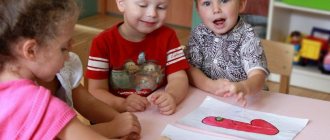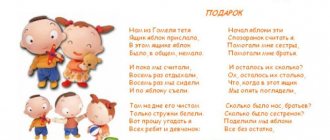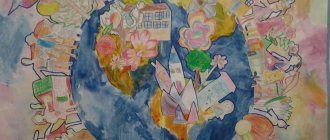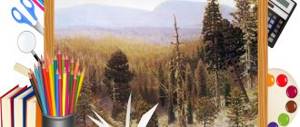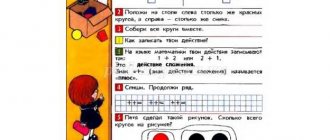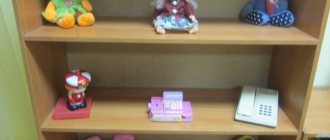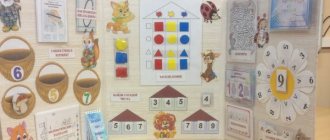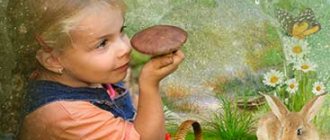From the experience of “Mathematics around us”
Galina Sagalova
From the experience of “Mathematics around us”
Mathematics classes from a very early age develop children's mental abilities. And the brain, like muscles, needs training.
To practice mathematics, children do not need special talents, such as a voice for a singer, an ear for music for a musician, plasticity for a ballerina, or the ability to subtly distinguish colors for an artist. On the contrary, mathematics itself increases the child’s skills and abilities, disciplines the mind, develops ingenuity, memory, intelligence, willpower, and forms logical thinking.
You don't even have to sit at a table to do math Look around... Everything that surrounds us is subject to the laws of mathematics : everything can be counted and measured, arranged in space and found similarities with geometric shapes and figures, etc. Thus, children's activities contain enormous opportunities for the mathematical development of children .
Because you can count everywhere: at home, on the street, in the park, in public transport.
mathematical concepts and knowledge in his own play, educational and practical activities, in everyday life, where the need for knowledge, skills and abilities arises, which he must master in mathematics classes and in communicating with the surrounding reality. Children must understand that they really need the knowledge they have acquired and have learned to use it. This will further develop children's interest in mathematics and expand their knowledge.
Mathematical readiness is rightfully among the most important criteria for children’s readiness to study at school . Especially today, in the age of new technologies, there is no point in arguing about the importance of this criterion. Therefore, the problem of studying the mathematical readiness of future first-graders to study at school is undeniably relevant today and quite interesting to study both at the theoretical and practical levels.
For me, as a teacher, one of the most important tasks in raising children is to ensure that the knowledge acquired by children in the process of learning in mathematics is used in various activities and in life.
"Name it correctly"
Every morning, my children and I clarify the name of the current month and day of the week.
They consolidate knowledge during a walk about the seasons, parts of the day, days of the week, and months.
By observing certain phenomena, children consolidate the knowledge acquired in class and learn to operate with them. While observing the trees, compare the heights of trees and bushes. They learn to find a thick and thin trunk, note that the road along which cars drive is wide, the sidewalk where people walk is narrower, and the path is very narrow.
Comparing trees with different trunk thicknesses
"We are on duty"
Performing the duties of those on duty in the dining room, when setting the table, counting items, placing them correctly (to the right, to the left of the plate, in the middle of the table)
preparing
materials and aids for the lesson . Children consolidate mathematical concepts , counting skills, location of objects, and the ability to navigate in space.
"Duty in a corner of nature"
By caring for plants in a natural area, children reinforce ideas about liquid volume, capacity, measurement and comparison by volume.
Compare plant leaves by length and width.
Compare the size of the plants and the size of the pot and determine which plant needs more water, which needs less, and explain why?
"Wonderful bag"
Playing the game "Wonderful Bag"
, children consolidate their knowledge of flat and three-dimensional figures. Examine the geometric shape of objects, practice distinguishing shapes.
«Mathematical kinder»
To strengthen the ability to solve arithmetic examples on addition and subtraction.
Continuing to introduce children to the composition of a number from two smaller ones (up to 10)
.
I use didactic games, for example, “
Mathematical Kinder ” “Board games with mathematical content ”
By playing board games, children's mental activity is activated, children learn to plan their actions.
"Plot-role-playing games"
.
In a variety of role-playing games, spatial, quantitative and temporal ideas of children are consolidated. For example, organizing a role-playing game “Supermarket”
,
“Cafe”
or
“Pharmacy”,
children count the items that will be sold, put price tags on them (numbers), prepare banknotes, manipulate them. Get acquainted with coins in denominations of 1, 5, 10 kopecks, 1, 2, 5,10 rubles. Get acquainted with scales.
“Get ready to exercise”
In physical education classes, children often encounter quantitative and ordinal counting in constructions. Strengthen the ability to determine in a word the position of an object in relation to oneself or another person. (right, left, front, back, etc.)
.
They line up in two or three columns, disperse in pairs to the right and left, forming circles. Circles can be inside another general circle, one moving to the left, the other to the right; marching around the hall (in a rectangle, emphasizing the corners at turns, running “in a circle”
,
“loosely”
,
“snake”
, etc.). When performing various types of exercises, the ability to navigate in space is strengthened.
Slide 16. “We dance and sing”
Playful music classes and musical warm-ups in kindergarten contribute to the development of mathematical concepts in preschoolers, such as the ability to navigate in space - right, left, forward, backward, walking in a circle, scattered, various formations - in a line, in a column, in several circles in the initial part of a musical lesson, then during the performance of musical and rhythmic movements in dance compositions, round dances, and musical games.
"Invitation to Visit"
While playing, children consolidate their knowledge of home address, street name, house number, entrance, apartment.
"We are growing"
When clarifying children’s ideas about the size of objects, we talk about which of the children in the group is the tallest. Children stand in twos, back to back, and the rest determine which of them is taller. We use a stadiometer.
"Outdoor games with mathematical content "
Various outdoor games used during a walk with mathematical content : “Magic squares”
,
“Measuring”
,
“All year round”
, etc. They teach children to navigate in time and space, consolidate knowledge about measurements with conventional standards or generally accepted measures. Count distances in steps, pronounce words that determine the position of an object in space.
When planning work in mathematics , I try to do it in a playful way, using fairy-tale characters. Together with the guys, they find themselves in different stories, extraordinary adventures happen to them. Together with the heroes of fairy tales, children receive gifts, sympathize with each other and empathize. In the course of direct educational activities, we go on a trip, for example, to “Auntie Owl”
, or to
"Masha and the Bear"
. We rush to help Dunno, or Nolik. Let's go on a trip around the world.
When working with parents , I pay attention to (parents)
that the knowledge that children receive in kindergarten can be consolidated on the way home from kindergarten.
You can teach how to navigate on the street (know the name of the street on which the kindergarten is located, the number of the house and apartment where the child lives, draw children’s attention to the fact that numbers can be seen everywhere: on buses, numbers of houses, cars, apartments, that the house numbers are not in order (they are even and odd)
. In the store, draw the children’s attention to the prices of various goods. Reinforce the acquired knowledge at home, playing with the child. The home environment contributes to the emancipation of the child, and he learns educational
material in an individual way pace. Parents, in turn, learn a lot about their child. You can diversify tasks endlessly
